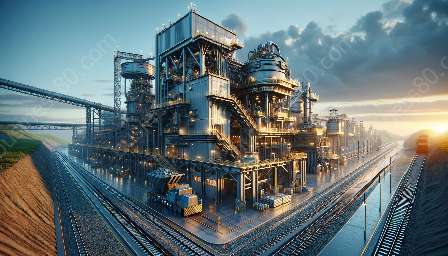Iron ore mining is a crucial industry that provides the raw material for steel production, but it also poses significant environmental challenges. This article explores the environmental impacts of iron ore mining and its compatibility with the wider metals & mining industry.
Introduction to Iron Ore Mining
Iron ore is a vital component in the production of steel, making it a critical industry for global infrastructure development. Mining activities associated with iron ore extraction have the potential to significantly impact the environment, raising concerns about deforestation, water and air pollution, and wildlife habitat disruption.
Deforestation and Habitat Disruption
The clearing of land for iron ore mining can result in extensive deforestation, leading to habitat loss for various flora and fauna. This can disrupt ecosystems and contribute to the decline of biodiversity. Consequently, sustainable mining practices and reforestation efforts are essential to mitigate these impacts.
Water Pollution and Contamination
Iron ore mining operations often involve the extensive use of water for processing and transportation. This can lead to water pollution through the discharge of mining by-products and the contamination of natural water sources. Implementing effective water management and ensuring proper treatment of wastewater are critical in minimizing the environmental impact on water resources.
Air Pollution and Emissions
Iron ore mining and processing activities can release airborne pollutants such as particulate matter, sulfur dioxide, and nitrogen oxide, contributing to air pollution and acid rain. Utilizing advanced emission control technologies and promoting cleaner production processes are crucial for reducing air emissions and improving air quality in mining areas.
Land Reclamation and Rehabilitation
After the completion of iron ore mining activities, it is necessary to restore the affected land to its original state through reclamation and rehabilitation efforts. This involves reshaping the landscape, restoring soil fertility, and reintroducing native vegetation to promote ecological recovery and sustainable land use.
Sustainable Mining Practices and Innovation
Addressing the environmental impacts of iron ore mining requires a collective effort from industry stakeholders, governments, and environmental organizations. Embracing sustainable mining practices, investing in innovative technologies, and promoting responsible resource extraction are essential for minimizing the ecological footprint of iron ore mining operations.
Compatibility with Metals & Mining Industry
As a subsector of the broader metals & mining industry, iron ore mining plays a pivotal role in meeting the global demand for steel and supporting economic growth. However, it is imperative to ensure that iron ore mining activities are conducted in an environmentally responsible manner, aligning with the industry's commitment to sustainable development and environmental stewardship.
In conclusion, the environmental impacts of iron ore mining are multifaceted and require proactive measures to mitigate adverse effects on the environment. By prioritizing sustainability, implementing effective environmental management strategies, and fostering innovation, the industry can minimize its ecological footprint and contribute to a more environmentally sustainable future.

